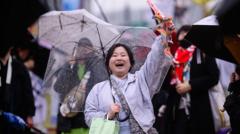South Korea's acting president has officially announced that the nation will hold a presidential election on June 3. This development comes after the country's constitutional court upheld the impeachment of former President Yoon Suk Yeol, who was removed from office following his controversial declaration of martial law in December. Acting President Han Duck-soo made the announcement, urging a swift recovery from the political upheaval that has rocked the country.
The constitutional court's decision, made on April 4, paved the way for a snap election to be held within 60 days. In his address, Han stated, "We must quickly heal from the wounds," noting the pressing need for the nation to move "upward and forward." Yoon's martial law order plunged South Korea into political chaos, exposing deep societal divisions. Han expressed regret over the confusion and anxiety caused to the populace during the four-month interim of leadership.
Initially, Yoon justified his martial law declaration by citing threats from "anti-state forces" and North Korea. However, it later became evident that the declaration was largely motivated by his domestic political struggles. Yoon is currently facing separate charges related to insurrection in a criminal court.
Some notable figures are already announcing their candidacies for the upcoming election. Labour Minister Kim Moon-soo has resigned from his position to enter the race, while Ahn Cheol-soo, a lawmaker from the ruling People Power Party who has previously contested three presidential elections, has also stepped forward. The leading candidate at this early stage is opposition leader Lee Jae-myung, who lost to Yoon in a closely contested election last year, currently boasting an approval rating of 34% according to a recent Gallup poll.
As South Korea navigates through this political crisis, the nation also faces mounting economic pressures, particularly concerning a new 25% tariff imposed on exports to the United States by President Donald Trump. Government officials are actively seeking negotiations with the Trump administration to mitigate the impact of these tariffs.
The constitutional court's decision, made on April 4, paved the way for a snap election to be held within 60 days. In his address, Han stated, "We must quickly heal from the wounds," noting the pressing need for the nation to move "upward and forward." Yoon's martial law order plunged South Korea into political chaos, exposing deep societal divisions. Han expressed regret over the confusion and anxiety caused to the populace during the four-month interim of leadership.
Initially, Yoon justified his martial law declaration by citing threats from "anti-state forces" and North Korea. However, it later became evident that the declaration was largely motivated by his domestic political struggles. Yoon is currently facing separate charges related to insurrection in a criminal court.
Some notable figures are already announcing their candidacies for the upcoming election. Labour Minister Kim Moon-soo has resigned from his position to enter the race, while Ahn Cheol-soo, a lawmaker from the ruling People Power Party who has previously contested three presidential elections, has also stepped forward. The leading candidate at this early stage is opposition leader Lee Jae-myung, who lost to Yoon in a closely contested election last year, currently boasting an approval rating of 34% according to a recent Gallup poll.
As South Korea navigates through this political crisis, the nation also faces mounting economic pressures, particularly concerning a new 25% tariff imposed on exports to the United States by President Donald Trump. Government officials are actively seeking negotiations with the Trump administration to mitigate the impact of these tariffs.




















